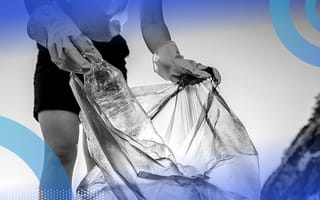Sweeping legislative action around sustainability across the world in recent years has changed the way brands do business, and the plastics sector is no exception. Regulatory frameworks such as the Federal Trade Commission's (FTC) Green Guides have opened new horizons for startups and emerging tech brands striving to revolutionize the bioplastics industry.
What Is the Federal Trade Commission’s Green Guides?
The FTC Green Guides are a set of rules and guidelines designed to help marketers avoid making misleading environmental claims. First issued in 1992, the Green Guides aim to enforce a greater degree of transparency and accuracy around environmental marketing.
With growing consumer skepticism towards eco-friendly claims, especially from larger corporations, startups are in a unique position to differentiate themselves. How has evolving sustainability legislation dictated new priorities for startups? How does greenwashing play into this conversation?
The Evolution of Legislation and Plastic Innovation
Plastic-related legislation has undergone a progressive evolution over the years. Driven by escalating concerns about environmental pollution, climate change and health, this evolution includes bans on single-use plastic items, microplastic restrictions and regulations endorsing recycling and composting, all of which have shaped the trajectory of plastic innovation.
We’re also seeing consequences play out for larger brands that haven’t changed their ways. One example is a recent lawsuit against an airline alleging that their claims to be “the world’s first carbon-neutral airline” were misleading.
For startups, these legislative shifts have carved out new paths to explore. Each regulation serves as a call to action to devise innovative solutions compliant with these new rules. For example, bans on single-use plastics have led to a surge in startups focusing on alternatives such as biodegradable and reusable materials.
Companies like Loliware, Kelpi and Kaneka BioPolymers are examples of brands pushing forward innovation in the space. Loliware and Kelpi develop bioplastics made of seaweed. RWDC Industries also utilizes used cooking oil to produce unique bioplastics.
Single-Use Plastics Bans and the Influence on Startups
Recently enacted policies around single-use plastics in major U.S. cities like New York City, Los Angeles, Seattle, Philadelphia and Washington, D.C. have opened doors for startups to devise bioplastic solutions catering to an urgent need for alternatives.
In comparison to larger conglomerates, startups and emerging tech brands are well-positioned to swiftly adapt and capitalize on new market spaces created by legislative action. The push towards bioplastics has led to a proliferation of more agile brands that focus on developing new, eco-friendly materials that adhere to standards outlined by guidelines like the Green Guides.
Thoughtful startups can be in a strong position for success from this perspective because they’re leaner than big corporations. This allows them to pivot priorities, reallocate resources and shift with the quickly changing environment. These smaller, more nimble businesses are not burdened by legacy systems or bureaucratic hierarchies that impede swift decision making. This means they’re able to iterate quickly on new ideas, development and deployment of new products. In addition, because of their size, startups often facilitate closer connections with their customer base, allowing them to receive, respond to and integrate user feedback into new product iterations far more quickly than larger conglomerates.
The FTC Green Guides’ insistence on accountability around environmental claims has also nurtured a market for startups offering lifecycle analysis, carbon footprint calculation and supply chain auditing services. These startups can aid businesses in substantiating their environmental claims and maintaining compliance.
Understanding the FTC’s Green Guides
The FTC’s Green Guides serve as a blueprint for businesses to avoid unsubstantiated environmental claims. They address marketing approaches for the environmental aspects of products and enforce a greater degree of transparency and accuracy.
The FTC recently concluded the public feedback phase for its updated Green Guides, which was last amended in 2012. While we don’t know exactly what the changes will entail, the upcoming 2023 revision is set to transform the playing field for startups engaged in plastics, particularly bioplastics. Bloomberg reported last month that the FTC alluded that ‘recyclable’ product claims might be under increased scrutiny in the new revisions.
Recent crackdowns on greenwashing have prompted startups to prioritize transparency and third-party validation. This has encouraged emerging brands to reinforce their claims with scientific evidence.
Preparing for a Startup-Driven Circular Economy
As legislation evolves, plastic innovation startups must remain nimble, open minded and informed to seize arising opportunities. Smart entrepreneurs should start to align their product market strategies with anticipated legislative trends. In this moment of change on the global stage, sustainability startups are in a unique position to create products that could change the way we view plastic.
The close relationship between legislation and innovation will continue to shape the future of plastics. The startup community, with its inherent flexibility and ability to pivot, is well positioned to spearhead the journey toward a future of reduced waste and a circular economy.





